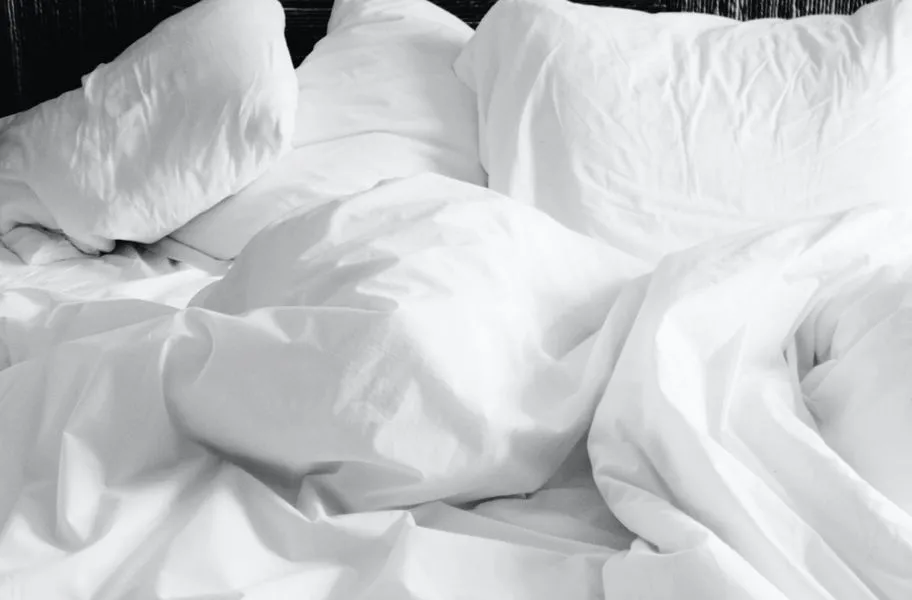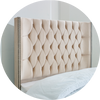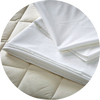Your bag is empty
How Often Should You Change and Wash Your Bed Sheets?
Posted:
Jump To

How often should you wash your bedding? Once a week to two weeks. This keeps dirt, sweat and bacteria at bay and good hygiene and sleep. We’ll look at personal habits and allergies that might need more frequent washing.
Summary
- Wash bed sheets once a week to two weeks or more if you sweat a lot or have allergies.
- Duvets and pillows every 2 years and every 3 to 6 months respectively to keep clean.
- Keep your sleep environment clean by not eating in bed, limiting pets in bed and breathable PJs.
How often should you wash your bed sheets?

The general rule of thumb is to wash bed sheets every one to two weeks to keep them free from dirt, sweat, and bacteria. However, lifestyle factors such as eating in bed, sleeping with pets, or sweating heavily can necessitate more frequent washing. Dirty sheets can lead to various health issues, including allergies, asthma, and even skin infections. Regularly washing your sheets helps maintain cleanliness and promotes a good night’s sleep.
Fresh sheets not only improve hygiene but also enhance sleep quality. There’s something undeniably soothing about slipping into clean, crisp bedding.
However, the ideal washing frequency for your sheets varies based on individual needs. It depends significantly on your personal hygiene habits, body temperature, and any allergies you might have.
Personal hygiene habits
How often you should wash your sheets depends greatly on your personal hygiene habits. For instance, if you take evening showers, you’re likely transferring less dirt and sweat onto your bedding, which means you might not need to wash your sheets as frequently. On the other hand, if you skip showers or go to bed with makeup on, you should consider washing your sheets more regularly to prevent the buildup of dirt and oils.
Maintaining good hygiene practices, such as regular showers, can contribute to a cleaner sleep environment and reduce the frequency of washing sheets. Still, washing your bedding regularly removes accumulated dead skin cells and body oils, regardless of your hygiene habits.
Impact of body temperature
Another important factor is body temperature. Hot sleepers, or those who tend to sweat a lot at night, should wash their sheets more frequently than once a fortnight. Sweat can quickly build up, leading to an unhygienic sleep environment.
Cooling bed sheets might help reduce the frequency of washing by managing the amount of sweat absorbed.
Dealing with allergies
For those dealing with allergies, washing your bedding every week is essential to reduce allergens such as dust mites. If you suffer from more severe allergies, like a dust mite allergy, you might need to wash your bedding at least twice a week to keep symptoms at bay.
For allergy sufferers, frequent washing minimizes irritants, promoting a healthier sleep environment.
Washing duvets and pillows

When it comes to duvets and pillows, the washing frequency is less frequent but equally important. Duvets and pillows should be washed at least twice a year to maintain hygiene and comfort. Factors such as the age of the duvet, frequency of use, and personal habits like sweating or allowing pets on the bed can affect how often you should wash these items. Always check the washing instructions on the care label before washing a duvet to ensure you’re following the manufacturer’s guidelines.
If your duvet is too large for your washing machine, consider taking it to the dry cleaners. Similarly, pillows should be washed every three to six months and replaced every one to two years to ensure they provide proper support and hygiene.
Frequency of washing duvets
Duvets should be washed at least twice a year for optimal hygiene. If you sweat a lot or allow pets on your bed, you might need to wash your duvet more frequently, even as often as weekly. However, washing a duvet more than four times a year can lead to unnecessary wear. Finding a balance based on your specific needs and habits is important.
If your duvet is too large for your washing machines, don’t hesitate to take it to the dry cleaners. This will ensure it gets a thorough clean without causing damage to your washing machines or the duvet itself.
Pillow care tips
Pillows, like duvets, require regular washing to maintain hygiene. Ideally, pillows should be washed every three to six months. Washing two pillows at once can help maintain their shape and prevent them from becoming lumpy. When cleaning memory foam pillows, it is important to remove the cover. Do not machine wash the foam itself.
Pillows should be washed on a delicate cycle to prevent damage and dried thoroughly to avoid moisture buildup, which can lead to mold and mildew.
Remember to replace your pillows every one to two years to ensure they continue to provide proper support and hygiene.
Maintaining mattress cleanliness

Keeping your mattress clean is just as important as washing your bedding. Cleaning your mattress every six months helps maintain hygiene. Vacuuming your mattress regularly removes dust and allergens, contributing to a healthier sleep environment. Additionally, using a mattress protector can significantly reduce the frequency of mattress cleaning by preventing dirt and moisture from reaching the mattress.
Pets and food can introduce dirt and bacteria onto your mattress, disrupting a clean sleeping environment. Keeping pets off the bed and avoiding eating in bed can help maintain mattress cleanliness and prevent allergens from building up.
Vacuuming and spot cleaning
Vacuuming regularly is important for mattress hygiene. It’s recommended to vacuum your mattress every couple of months using the vacuum cleaner at the lowest setting to avoid damaging the fabric. This practice helps remove dust mites and other allergens, ensuring better sleep quality and hygiene.
Spot cleaning is also essential for addressing stains and spills as soon as they occur. Using a mild stain remover can prevent stains from setting and keep your mattress looking and smelling fresh.
Consistent maintenance extends the life of your mattress and promotes a healthier sleep environment.
Using mattress protectors
A mattress protector is an effective way to keep your mattress clean. A waterproof mattress protector can prevent moisture buildup, which can lead to bacteria growth and mold. This not only helps maintain mattress cleanliness but also extends the life of your mattress, ensuring a healthier sleep environment.
How to wash different types of bedding
Different types of bedding need different care to keep them in good condition. Always check the care label for the hottest temperature allowed to wash. For example cotton sheets can be washed at higher temperature while linen and silk need to be handled gently. Knowing the specific needs of each fabric will keep your bedding clean and in good condition.
Heavily soiled bed sheets should be washed in hot water at the highest temperature allowed to get them thoroughly clean. For yellowed sheets soak them in a baking soda mixture before washing to restore their whiteness.
Cotton fabrics
Cotton sheets are durable and can be washed at high temperature 60°C to kill bacteria and be hygienic. Washing cotton sheets regularly at least once a week is important for comfort and cleanliness.
Following the recommended temperature will not only be hygienic but also extend the fabric’s life.
Linen sheets
Linen sheets should be washed at 40°C on the lowest setting to avoid damaging the fabric. Don’t wash linen sheets with heavy items to preserve their shape and quality.
With proper care your bed linen and linen sheets will be soft and durable for years to come.
Silk sheets
Silk sheets need special care. Hand wash them in lukewarm water no hotter than 30°C to avoid damage. Don’t twist or scrub the silk sheets during washing and dry them away from direct sunlight to preserve the quality.
Take care of your silk sheets and they will look luxurious and feel comfortable.
Tips for drying your bedding
Drying your bedding properly is important to prevent mold and fabric quality. Air drying outdoor is best as UV rays can naturally disinfect bedding and kill bacteria. If you’re drying indoor make sure to have good airflow to speed up the drying process and prevent mold.
While using a tumble dryer is easy, always check the care label and use the right setting for different materials. For example synthetic duvets should be dried on cool or air dry setting to avoid damage.
Air drying outdoor
Air drying outdoor uses UV rays to naturally disinfect bedding and kill bacteria. Compared to indoor drying methods air drying outdoor is often more effective in getting complete dryness and reduce the risk of mold and mildew growth.
Plus the fresh outdoor air will add a nice scent to your bedding.
Indoor drying options
When drying bedding indoor hang it in a well ventilated area with good airflow. Don’t dry sheets on the radiator as it’s not safe and may damage the fabric.
Effective indoor drying methods will be hygienic and prevent mold and bacteria growth on your bedding.
Tumble drying tips
Before tumble drying your bed sheets always check the care label to make sure it’s allowed. For synthetic duvets use the cool or air dry setting to avoid damage.
To keep bedding fluffy add tumble dryer balls or a tennis ball in a sock. Proper tumble drying will keep the quality and comfort of your bedding.
A healthier sleep space
A clean sleep space can improve sleep quality. A clean sleeping area reduces allergens and better sleep quality. Simple habits like not eating in bed and limiting pet access can go a long way in keeping it clean and a healthier sleep space.
Using a dehumidifier in indoor spaces can reduce moisture and speed up the drying process. Airing out bedding in fresh air can naturally deodorize it, remove odors caused by sweat and oils.
These simple changes can make a big impact on your overall health.
Don’t eat in bed
Eating in bed can cause hygiene issues, attract pests and spills that will require more frequent washing of linens. Eating in bed regularly can create a breeding ground for germs and bacteria so you need to wash sheets more often.
Avoid this habit and maintain a healthier sleep space and less frequent cleaning.
Limit pet access
Limiting pet access to the bed will reduce allergens and dirt accumulation in bedding. Pets can bring in fur and dander which are major allergens that affect sleep quality and overall health.
Designate a sleeping space for your pets and use pet gates to create a cleaner sleep space.
PJs
Wearing breathable PJs can reduce the transfer of body oils and sweat to your bed sheets and maintain a cleaner sleep space. Right sleepwear will reduce skin to bedding contact and reduce oils and dirt accumulation on your sheets.
This habit can extend the time between washes and a better sleep.
Conclusion
Cleaning your bedding is more than just about comfort it’s part of a healthy sleep space. Wash your bed sheets every 1-2 weeks and clean your duvets and pillows regularly to prevent buildup of allergens, bacteria and dust mites. Your personal hygiene habits, body temperature and allergies will determine how often you should wash your bedding.
By following the right washing and drying methods you can extend the life of your bedding and have a fresher sleep space. Remember a small time investment in your bedding can result to big improvements in your overall health and well-being. So take these tips to heart and have cleaner and comfier nights.
FAQs
How often should I wash my bed sheets?
You should wash your bed sheets every 1-2 weeks for hygiene. If you sweat a lot, have pets on your bed or snack while lounging, wash them more often.
How do I wash my silk sheets?
Hand wash your silk sheets in lukewarm water (not hotter than 30°C) and don’t twist or scrub them. Dry them away from direct sunlight to keep them in great condition.
How often should I wash my pillows?
Wash your pillows every 3-6 months to keep them clean and hygienic. Also replace them every 1-2 years for optimal support.
What are the best ways to dry bedding indoors?
Best way to dry bedding indoors is to hang it in a well ventilated area to promote good airflow. Avoid putting sheets on radiators to prevent fabric damage and safety.
How do I keep my mattress clean?
Vacuum every 2 months and get a waterproof mattress protector to prevent moisture and allergens. Easy peasy!
Posted:
 Divan Bases
Divan Bases Headboards
Headboards Furniture
Furniture Bedding
Bedding



